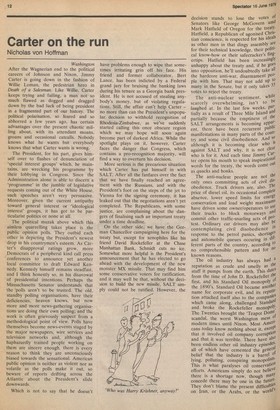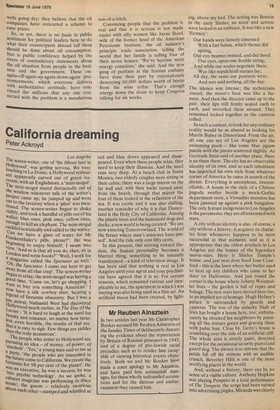Carter on the run
Nicholas von Hoffman
Washington After the Wagnerian end to the political careers of Johnson and Nixon, Jimmy Carter is going down in the fashion of Willie Loman, the pedestrian hero in Death of a Salesman. Like Willie, Carter keeps trying and failing, a man not so much flawed as dogged and dragged down by the bad luck of being president in a fragmented part of our history. The political polarisation, so feared and so abhorred a few years ago, has certain advantages over the present chaotic milling about, with its attendant moans, groans and occasional catcalls. Nobody knows what he wants but everybody knows that what Carter wants is wrong.
The President, for his part, gives himself over to flashes of denunciation of 'special interest groups' which, he maintains, are wrecking his programme by their lobbying in Congress. Since the Administration alone is able to discern a 'programme' in the jumble of legislative requests coming out of the White House, such speeches aren't very persuasive. Moreover, given the current antipathy toward general interest or 'ideological interest' groups, it has got to be particularist politics or none at all.
The political muzak above which this aimless quarrelling takes place is the public opinion polls. They outbid each other in depicting the President's newest drop in his countrymen's esteem. As Carter's disapproval ratings grow, more Democrats of a peripheral kind call press conferences to announce yet another local committee to draft Edward Kennedy. Kennedy himself remains steadfast, and I think honestly so, in his disavowal of presidential intentions. Perhaps the Massachusetts Senator understands that the polls aren't to be trusted. The old, standby polling organisations, have their deficiencies, heaven knows, but now more and more news-gathering organisations are doing their own polling; and the work is often grievously suspect from a methodological point of view, Polls have themselves become news-events staged by the major newspapers, wire services and television networks and, although the haphazardly trained people working on them are sincere enough, there is every reason to think they are unconsciously biased towards the sensational. American public opinion is neither as violent nor as volatile as the polls make it out, so beware of reports drifting across the Atlantic about the President's slide downwards. have problems enough to wipe that sometimes irritating grin off his face. His friend and former collaborator, Bert Lance, has been indicted by a Federal grand jury for bruising the banking laws during his tenure as a Georgia bank president. He is not accused of stealing anybody's money, but of violating regulations. Still, the affair can't help Carter — no more than can the President's unpopular decision to withhold recognition of Rhodesia-Zimbabwe, as we've suddenly started calling this once obscure region which we may hope will soon again become part of darkest Africa. While the spotlight plays on it, however. Carter faces the danger that Congress, which contains a pro-recognition majority, will find a way to overturn his decision.
More serious is the precarious situation which Carter has put himself in with SALT. After all the fanfares over the fact that we have finally reached an agreement with the Russians, and with the President's foot on the steps of the jet to Vienna for the signing ceremony, it has leaked out that the negotiations aren't yet completed. The Republicans, with some justice, are complaining about the dangers of finalising such an important treaty under a time deadline.
On the other side, we have the German Chancellor campaigning here for the treaty but, except for xenophiles like his friend David Rockefeller at the Chase Manhattan Bank, Schmidt cuts no ice. Somewhat more helpful is the President's announcement that he has elected to go ahead with the development of the new monster MX missile. That may find him some conservative voters for ratification, and it may well be that, without the decision to build the new missile, SALT simply could not be ratified. However, the Spectator 16 June 1979 decision stands to lose the votes of Senators like George McGovern arnd Mark Hatfield of Oregon for the treaty. Hatfield, a Republican of agonised Christian conscience, is respected for his ideals as other men in that dingy assembly are for their technical knowledge, their political know-how or their safecracker's fingertips. Hatfield has been increasinglY unhappy about the treaty and, if he goes into opposition, he'll undoubtedly take all the hardcore anti-war, disarmament per)" pie with him. That may not add up to many in the Senate, but it only takes 35 votes to reject the treaty. The anti-nuclear sentiment, while scarcely overwhelming, isn't to be laughed at. In the last few weeks. partially as a result of Three Mile Island alto partially because the emptiness of the SALT arrangements is becoming aPPar: ent, there have been recurrent public manifestations in many parts of the COUP try and some civil disobedience. And s.o although it is becoming clear who Is against SALT and why. it is not clear who is for it. And each time Jimmy .Car; ter opens his mouth to speak inspirational words for the treaty, the words come out as quacks and honks. The anti-nuclear people are not th.e only ones committing acts of civil disobedience. Truck drivers are, also. The price of diesel oil, its occasional complete absence, lower speed limits for energY conservation and load weight maximums have driven some owner/operators to use, their trucks to block motorways an' commit other traffic-snarling acts of pro" test. Ordinary car drivers may also be contemplating civil disobedience le response to the petrol panics, shortages and automobile queues occuring in dif' ferent parts of the country, according t° no comprehensible pattern and for II° known reasons.
The oil industry has always had 3 reputation as crude and smelly as the stuff it pumps from the earth. This dates from the time of John D. Rockefeller the first, and his Standard Oil monopoly °I the 1890's. Standard Oil became another name for corporate evil, and its repot. tion attached itself also to the companies which came along, challenged Standard and broke the Rockefeller monopolY: The Twenties brought the 'Teapot Dole, scandal, the worst Washington mess 0,1 modern times until Nixon. Most Anterl: cans today know nothing about it, exceP that it involved oil company corruptl011 and that it was terrible. There have als° been endless other oil industry episodes' all of which have cemented the general belief that the industry is a barrel. of lying,polluting, conspiring monopolists i . This s what paralyses oil conservation efforts. Americans simply do not believe i there s a shortage now, though Ina° concede there may be one in the future' They don't blame the present difficultie? on Iran, or the Arabs, or the world s wells going dry: they believe that the oil companies have concocted a scheme to raise prices.
So, as yet, there is no basis in public sentiment for political leaders here to do What their counterparts abroad tell them Should be done about oil consumption. Nor is public confidence helped by the rivers of contradictory statements about the oil situation from people in the business and the government. These onagam-off-again-up-again-down-again pronouncements, which everyone delivers with authoritative certitude, have convinced the millions that any one connected with the problem is a mendacious son-of-a-bitch. Convincing people that the problem is real and that it is serious is not made easier with silly women like 'Jayne Ikard, wife of the former head of the American Petroleum Institute, the oil industry's principle trade association, telling the world that her family is selling four of their seven houses. 'We've become more energy conscious,' she said. And the new gang of puritans at the Iranian embassy have done their part by ostentatiously destroying 60,000 dollars worth of booze from the wine cellar. That's enough energy down the drain to keep Congress talking for six weeks.



































 Previous page
Previous page